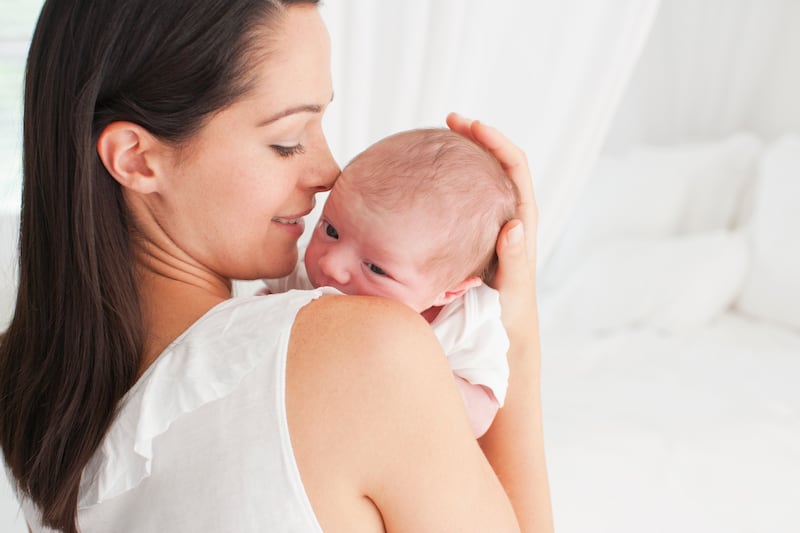PREGNANCY, childbirth and caring for a newborn make huge demands on both the body and mind, and new mums taking time to recover is vital for both their welfare and baby’s.
But it’s often not as simple as just trying to put your feet up – there are many things new mums might not be expecting during their postpartum recovery.
It’s important for new mums to rebuild their strength by getting plenty of rest, eating healthily, and getting help with chores and shopping for the first few weeks after the birth, stresses Michelle Lyne, professional advisor for education at the Royal College of Midwives (RCM).
“It’s really important that you take care of yourself after the birth so you’re in the best possible shape physically and mentally to look after your new baby,” she says, pointing out that a new mum’s midwife will support her for at least the first 10 days after the birth, and then a health visitor will take over, either in person or via video or telephone while pandemic restrictions are in place.
“Many things are normal after the birth, such as some vaginal bleeding and stomach cramps, but if you’re at all worried about yourself or your baby, contact your midwife straight away,” she stresses.
And midwife Lesley Gilchrist, founder of My Expert Midwife (myexpertmidwife.com), adds: “When caring for a newborn, it can be difficult for new mums to make their own rest and recovery a priority – while many feel guilty if they do.
“However, this is a crucial part of the recovery process, and the better new mums feel, both physically and emotionally, the easier the transition into family life will be. But there may well be things a mum experiences during her recovery that she just wasn’t prepared for.”
Here Gilchrist shares some of the lesser-known aspects of postpartum recovery, along with guidance on how new mums can prioritise their physical recovery…
1. Stomach cramps
“Many women experience painful cramps for a short time after giving birth as their uterus contracts back to its pre-pregnancy size,” explains Gilchrist. “This is usually a six-week process called involution, which can feel like short, sharp cramps in the abdomen a couple of days after birth.”
Post-birth contractions are more noticeable after multiple births, she says, with many first-time mums only suffering mild symptoms. But it’s important to contact your GP if you have intense pain for a long time, she stresses.
2. Bleeding
Vaginal bleeding, also known as lochia, is a combination of amniotic fluid, tissue and blood, which the womb sheds as it replaces its lining after birth. Bleeding typically lasts around seven to 10 days, explains Gilchrist, although it can last more or less than this as every woman’s body responds differently to birth.
“Some women may find blood loss increases while their baby is breastfeeding as the hormones for feeding help the uterus to contract,” she says. “This is completely natural and shouldn’t be a cause for concern – but stocking up on postnatal pads and underwear is a good idea to help avoid any leaks.”
3. Incontinence
Up to a third of mums experience bladder leaks while sneezing, laughing or performing strenuous activity in the first three months after giving birth, says Gilchrist.
“This can be caused by weakened pelvic floor muscles, pelvic organ prolapse, or damage to the nerves responsible for bladder control,” she explains. “Although common, postpartum incontinence can usually be managed with the help of a pelvic floor physiotherapist and by regularly performing pelvic floor exercises.”
4. Hair loss
During pregnancy, a sharp rise in oestrogen levels prevents normal hair loss, which is why expectant mothers’ hair often appears thicker and fuller. But hormone levels drop a few months after childbirth, causing hair to become thin or even fall out in clumps in the shower or while brushing, says Gilchrist.
“This can cause a lot of women to worry they’re losing their hair, but it’s important to remember the total amount of hair lost after birth isn’t much more than normal, it just seems like it’s all happening at once. It’s usually temporary, so hair growth should return to normal by the end of the first year,” she says.
5. Increased sweating
Postpartum sweating often occurs when women are sleeping, and is thought to be caused by fluctuations of oestrogen and the body trying to rid itself of the extra fluids it used to nourish the baby. Gilchrist says this is temporary, and will gradually stop as the fluids leave the body and hormones settle down.
“In the meantime, to stay comfortable, I recommend drinking plenty of water to avoid dehydration, especially in the morning,” she says. “Wearing loose, lightweight clothing should ease any stickiness and make people feel more comfortable.”
6. Perineal soreness
Clinical data shows nine in 10 first-time mothers who have a vaginal birth experience some degree of perineal trauma, which can cause significant discomfort during the postpartum period, warns Gilchrist.
“While research indicates that carrying out perineal massage from 34 weeks can help prevent perineal tearing and reduce the need for an episiotomy during childbirth, if either does occur, there are several ways to help relieve soreness,” she says.
She advises keeping the vaginal area clean and wiping from front to back to avoid contaminating the area, and changing maternity pads every two to three hours.
And she says taking frequent 10-minute warm baths containing soothing ingredients like tea tree, bergamot and calendula in the weeks after childbirth, particularly after an episiotomy or tearing, can help ease pain, promote healing, and improve perineal hygiene.
7. Haemorrhoids
Haemorrhoids (piles) are a weakness in a vein around the anus that causes blood to bulge in it, causing pain, swelling, itching and (in some cases) bleeding. This can often occur during pregnancy due to the weight of the uterus and baby on the pelvic floor, as well as after a vaginal birth, as the birth canal is next to the anus.
“Doctors will sometimes prescribe topical medications to treat the affected area, but there are also natural remedies which can help ease symptoms,” explains Gilchrist. “These include taking a sitz bath [a warm, shallow bath that cleanses the perineum] for 15 minutes several times a day, or placing an ice pack wrapped in a towel on the sore area to reduce swelling.”
:: For information on how maternity care might be affected during the pandemic, visit the RCM’s Advice for pregnant and postnatal women page (rcm.org.uk/advice-for-pregnant-women/).








